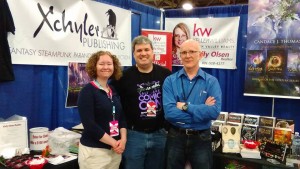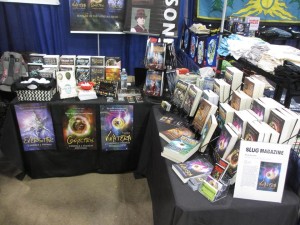FanX 2016: The hangover. I mean, the debriefing.
Posted by Rampant Coyote on March 28, 2016
 I spent the weekend at the Salt Lake City Comic Con FanXperience (or FanX), and had a blast. I was exhausted, I sold books but not as many as I would like, bought way too much stuff (mainly books and T-shirts), and I only went to one major celebrity panel (Alex Kingston of E.R. and Doctor Who). But I got to chat with a bunch of great friends, attend lots of great panels, and pretty much got to live and work at a massive geek party for three days.
I spent the weekend at the Salt Lake City Comic Con FanXperience (or FanX), and had a blast. I was exhausted, I sold books but not as many as I would like, bought way too much stuff (mainly books and T-shirts), and I only went to one major celebrity panel (Alex Kingston of E.R. and Doctor Who). But I got to chat with a bunch of great friends, attend lots of great panels, and pretty much got to live and work at a massive geek party for three days.
Xchyler Publishing has several authors here in Utah, and so we’ve teamed up to run a booth together for many events. This year, we even had a sponsor to help us out – Kelly Olsen of Keller-Williams. That made it much easier to not lose money on the booth. 🙂 It’s also incredibly fun to hang out with some very creative and talented individuals.
John Olsen posted a great write-up of several of the panels he attended. He and I attended a lot of the same panels, so our notes would be pretty similar. He’s done an outstanding job of hitting highlights and some of the key pieces of advice from those panels. There are also some great write-ups from my friends David West and Sarah Seeley.
Some of the panels I attended had nothing to do with making games or writing, but were just lots of fun. Like how to tell better stories as a game master in RPGs. 🙂 Although I’m pretty sure I can apply some of those ideas to game development.
 The writing panels I attended weren’t quite as deep as the ones at Life, the Universe, and Everything, but that makes sense considering the audience. The LTUE crowd tends to be more experienced, more “amateur” rather than “aspiring.” Still, there were a lot of great tips on everything from the craft of writing, to professionalism, to promotion. Some tips were repeated across multiple panels (especially when it was the same panelist), but here are a few tidbits:
The writing panels I attended weren’t quite as deep as the ones at Life, the Universe, and Everything, but that makes sense considering the audience. The LTUE crowd tends to be more experienced, more “amateur” rather than “aspiring.” Still, there were a lot of great tips on everything from the craft of writing, to professionalism, to promotion. Some tips were repeated across multiple panels (especially when it was the same panelist), but here are a few tidbits:
“Pantsing” vs. “Plotting” – or “Discovery” vs. “Outlining.” The difference here is whether an author just kinda jumps in with an idea of the characters and the situation and just runs with it … discovery or “pantsing” (meaning “seat of the pants”) or if they outline everything out in advance, and to what level. There are big, popular authors who do both. The thing that keeps coming up (for me) as this gets discussed is that the discovery writers really end up with a first draft that is a very elaborate outline, which they then have to whip into shape and give it some structure. The outliners… well, there are several layers of outlines, and for some writers, the story often starts deviating from the outline as they go. I think this tends to run more of a spectrum, really, and some of it depends on whether or not an author is under contract with a publisher that demands an outline.
 Another point that got brought up repeatedly was how different authors have different processes that work for them. Nobody works exactly the same. It seems like the point is to keep working on and refining your own process, until you find what works best for you. This is equally applicable to games development and writing, I think.
Another point that got brought up repeatedly was how different authors have different processes that work for them. Nobody works exactly the same. It seems like the point is to keep working on and refining your own process, until you find what works best for you. This is equally applicable to games development and writing, I think.
An amusing analogy: “Your brand-new idea for a story is your crush. Your book in development is your spouse.” The point being that it’s easy to get excited and passionate about things at first, but turning that into a complete work takes commitment and a lot of work.
Realize that you are going to have to leave stuff to your reader’s imagination. This is a good thing, if handled well. You can hint at the environment with just a few words, reveal the critical pieces, and let their imagination do the rest.
You can make a lot of mistakes as a writer (and as a game developer, IMO) and may be forgiven by the readers. But you absolutely must not be either boring or confusing.
 And finally, the point that gets brought up over and over again… writing is a skill, like any other. The “million words” advice was repeated in panel after panel… the idea that your first million words of creative writing are going to be crap… just practice… no matter how good you think you’ll be. Kevin J. Anderson’s wife, Rebecca Moesta, had a particular amusing story about that and how she just knew that she was going to be the exception. She kind of was, as she got a very extensive and personalized rejection for her first story, but had no idea how most authors struggle to get to that point. 🙂 Yeah, sometimes we get lucky from time to time (Julie Frost made a joke during LTUE about how as long as we’re practicing writing, we may as well practice submitting, and practice signing contracts, and practice cashing checks during that time). The bottom line is to sit down and get working on it, keep improving, and finish stuff. And yes, this advice applies 100% to indie game development as well.
And finally, the point that gets brought up over and over again… writing is a skill, like any other. The “million words” advice was repeated in panel after panel… the idea that your first million words of creative writing are going to be crap… just practice… no matter how good you think you’ll be. Kevin J. Anderson’s wife, Rebecca Moesta, had a particular amusing story about that and how she just knew that she was going to be the exception. She kind of was, as she got a very extensive and personalized rejection for her first story, but had no idea how most authors struggle to get to that point. 🙂 Yeah, sometimes we get lucky from time to time (Julie Frost made a joke during LTUE about how as long as we’re practicing writing, we may as well practice submitting, and practice signing contracts, and practice cashing checks during that time). The bottom line is to sit down and get working on it, keep improving, and finish stuff. And yes, this advice applies 100% to indie game development as well.
As a side note – someone came up to the booth this weekend (I wish I could remember his name) and told me how much he loved my story, “The Van Tassel Legacy,” from Mechanized Masterpieces 2. He wanted to know what other steampunk stories I’ve published since then (sadly, none, as I’ve been working on Frayed Knights 2 and other genres). Anyway, this totally made my day. My day? My week.
Anyway, I hope some of these bits of advice may be useful to you. Good luck!
Filed Under: Events, Writing - Comments: Comments are off for this article